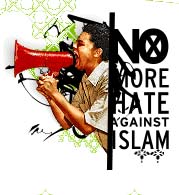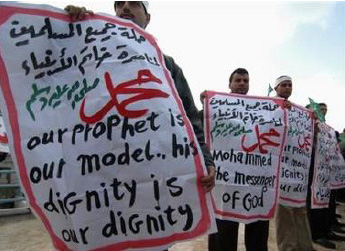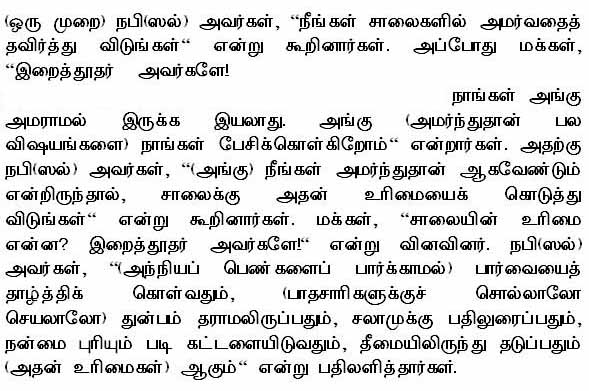

�You do not do evil to those who do evil to you, but you deal with them with forgiveness and kindness.� (Sahih Al-Bukhari)
That description of Islam�s Prophet Muhammad is a summary of how he reacted to personal attacks and abuse.
Islamic traditions include a number of instances of the prophet having the opportunity to strike back at those who attacked him, but refraining from doing so.
These traditions are particularly important as we witness outrage in the Islamic world over cartoons, initially published in a Danish newspaper, that were viewed as intentional attacks on the prophet.
Peaceful and not-so-peaceful protests have occurred from Gaza to Indonesia. Boycotts have targeted companies based in Denmark and in other nations that reprinted the offensive caricatures.
We all, Muslims and people of other faiths, seem to be locked into a downward spiral of mutual mistrust and hostility based on self-perpetuating stereotypes.
As Muslims, we need to take a step back and ask ourselves, �What would the Prophet Muhammad do?�
Muslims are taught the tradition of the woman who would regularly throw trash on the prophet as he walked down a particular path. The prophet never responded in kind to the woman�s abuse. Instead, when she one day failed to attack him, he went to her home to inquire about her condition.
In another tradition, the prophet was offered the opportunity to have God punish the people of a town near Makkah who refused the message of Islam and attacked him with stones. Again, the prophet did not choose to respond in kind to the abuse.
A companion of the prophet noted his forgiving disposition. He said: �I served the prophet for ten years, and he never said �uf� (a word indicating impatience) to me and never blamed me by saying, �Why did you do so or why didn't you do so?�� (Sahih Al-Bukhari)
Even when the prophet was in a position of power, he chose the path of kindness and reconciliation.
When he returned to Makkah after years of exile and personal attacks, he did not take revenge on the people of the city, but instead offered a general amnesty.
In the Holy Quran, Islam�s revealed text, God states: �When (the righteous) hear vain talk, they withdraw from it saying: �Our deeds are for us and yours for you; peace be on to you. We do not desire the way of the ignorant�. . .O Prophet (Muhammad), you cannot give guidance to whom you wish, it is God Who gives guidance to whom He pleases, and He is quite aware of those who are guided.� (28:55-56)
The Quran also says: �Invite (all) to the way of thy Lord with wisdom and beautiful preaching, and argue with them in ways that are best and most gracious: for thy Lord knows best who have strayed from His Path and who receive guidance.� (16:125)
Another verse tells the prophet to �Show forgiveness, speak for justice and avoid the ignorant.� (7:199)
These are the examples that Muslims should follow as they express justifiable concern at the publication of the cartoons.
This unfortunate episode can be used as a learning opportunity for people of all faiths who sincerely wish to know more about Islam and Muslims. It can also be viewed as a �teaching moment� for Muslims who want to exemplify the prophet�s teachings through the example of their good character and dignified behavior in the face of provocation and abuse.
As the Quran states: �It may well be that God will bring about love (and friendship) between you and those with whom you are now at odds.� (60:7)
"Any insult to the Holy Prophet (Peace Be Upon Him) is an insult to more than 1 billion Muslims and an act like this must never be allowed to be repeated," Afghan President Hamid Karzai said in a statement.
"Everyone has the right to peacefully protest defamatory attacks on their religious figures, but protestors should not reinforce existing stereotypes by resorting to violence or inflammatory rhetoric,"
[Ibrahim Hooper is National Communications Director for the Washington-based Council on American-Islamic Relations (CAIR), the nation�s largest Muslim civil liberties group. He may be contacted at: [email protected] ] www.cairnet.org
As deplorable as the cartoons about Prophet Muhammad in Denmark's Jyllands Posten have been, the violence that ensued is also condemnable. The cartoons depicted Islam's most revered personality, Prophet Muhammad, in a way that was inaccurate, intentionally derogatory and provocatively inciting. Other than demonstrating visceral hatred toward Islam, the cartoons achieved little else.
Muslim outrage over the cartoons has led to boycotts of Danish products across much of the Middle East. Protests across the Islamic world have been mostly peaceful, but some have, unfortunately, turned violent. Once again, the barbarism of a handful of Muslims has overshadowed the peaceful voice of the overwhelming majority of Muslims worldwide.
This flap was entirely avoidable, had all sides approached the issue with wisdom, tolerance and restraint.
At the core of the reactions in the Muslim world are fears about Western motives, bolstered by lack of redress of ongoing grievances. On the other hand, lack of understanding about Islamic culture explains why many in the West seem perplexed at how a mere cartoon could draw such an emotional response.
A tasteless caricature of a religious personality, whose life has informed and guided billions of people for more than 1,400 years, is neither funny nor satirical. On the other hand, burning flags, destroying embassies and threatening innocent people are hardly appropriate responses.
The Prophet Muhammad, who preached repelling evil with kindness, would not approve of such violent acts. He would have responded by educating the ignorant.
Courtesy: www.dallasnews.com - Dallas Morning News, 2/12/06
Freedom of speech is not forgotten and it never takes a back seat. However, free speech does not exist in a vacuum.
There are numerous other intangibles that accompany everyday life. Some of these are tolerance, religious and cultural pluralism, respect and sensitivities. It would be misleading to characterize the recent publication of derogatory cartoons of Prophet Muhammad by a Danish newspaper solely as a free speech issue.
Muhammad (Pbuh) is a revered and highly respected personality to billions of people in the world. Not only people living in a certain area of the world but across the globe.
When a person of such stature is ridiculed it is bound to deeply hurt people. To Muslims it's not only a matter of the Prophet being depicted in a caricature which many Muslims believe is not permissible. The reasons being:
o At the time of the Prophet there were no cameras or any paintings of him so any portrayal now would be misleading.
o To avoid idolatry which is something the Prophet himself prohibited.
But the bigger issue yet is not only a physical portrayal of the Prophet, but an extremely offensive linking of the Prophet to murder and mayhem.
Imagine a person as revered as the Prophet being portrayed as a murderer, bomber, and terrorist. It offends Muslims sensitivities. In a pluralistic society these sensitivities ought to be understood for the sake of harmony and should not be brushed away by a broad stroke of free speech.
The Holocaust or lynchings of African Americans are not ridiculed because they are sensitive matters. If one was to ridicule these events they would be protected by freedom of speech yet it would be highly disrespectful and irresponsible speech bound to deeply offend people.
Perhaps, yet another offensive aspect of these cartoons is the hate they propagate. Ever since Sept. 11, Muslims have been stereotyped as terrorists and violent. These cartoons only further that hate and stereotyping by portraying the leader of the religion as a terrorist himself. Given the current times such portrayals are highly counterproductive and incite hate.
Areeb [Naseer is legal counsel for the Florida Chapter of the Council on American-Islamic Relations, based in Pembroke Pines. E-mail him at [email protected].] www.cairnet.org
A year ago, United Nations Secretary-General Kofi Annan said: "When the world is compelled to coin a new term to take account of increasingly widespread bigotry � that is a sad and troubling development. Such is the case with `Islamophobia'." This phobia seems to be on the rise, as the publication of vicious cartoons depicting Prophet Muhammed by a Danish newspaper, and their re-publication by several newspapers across Europe, have demonstrated. At a time when Muslims across the world feel deeply offended by prejudiced stereotypes of Islam post-9/11, the cartoons have not just been insensitive, they have been downright provocative. In the first instance, they offend the strong belief among Muslims that the Prophet must not be depicted in any way.
The Koran prohibits idolatory or giving shape or form to Allah, who must not be objectified. But the specific prohibition on graphic or other depictions of the Prophet derives from his hadiths to the effect that neither his grave nor anything connected with him should, after his death, become an object of worship. Aside from this, the cartoons promote hate by suggesting that Islam preaches violence and terrorism. While Jyllands-Posten, the newspaper that originally published the cartoons, responded with a quick apology, other European newspapers, notably in France, decided to republish the cartoons on the ground that they were defending freedom of expression. Freedom of expression is supremely important. But surely it does not require its champions crassly to cause offence to the faith and beliefs of an identifiable group. At the end of the day, the European newspapers have to reflect on the consequences of their actions: eight killed, many more injured, and the anger of hundreds of millions of Muslims worldwide re-fuelled.
On the other side, the violent reactions in the Muslim world, against all manner of targets, including the Dutch embassy in Lebanon, have been uncalled for. From Europe to West Asia to South Asia and South-East Asia, the steady ramping up of the protests smacks of orchestration by elements in countries with Muslim populations that are out to squeeze political mileage out of the situation. Extremism feeds extremism, and the anti-cartoon protesters have played right back into the hands of the Islamophobes. The image of a Muslim in London made up as a suicide bomber, and the open threats of another 7/7 by marching demonstrators, have evoked anger across Britain, which is struggling to contain Islamophobia in the aftermath of the underground bombings. Commendably, British newspapers displayed a rare unanimity in deciding not to reproduce the cartoons. The protesters in London should have paused to think about that, just as they should have in New Delhi. It is still not too late for both sides � the European media and the militant protesters � to step back and prevent the controversy from growing into a full-size, hugely divisive, and ugly confrontation.
Courtesy: www.hindu.com/2006/02/09/stories/2006020908581000.htm
Dear Sir,
We were extremely offended not only as Muslims but as humans by the cartoons that were published by the Danish newspaper Jyllands-Posten portraying the prophet Muhammad (Pbuh) in what we believe as a stereotypical unfounded offensive imagery. Prophet Muhammad not only was a messenger, but he also embodied and exemplified universal human values that no Muslim, Christian or Jew could disagree upon. We believe that attacking the person of the prophet in such, a stereotypical generalized way, is an attack on these human values themselves. Therefore we are not only recording here our outrage as Muslims but also as Christians and humans.
Finally, it is not an Islamic act to counter-attack with an equally offensive response; we only have one remark to make, no Muslim will ever portray Jesus Christ in an equally insulting way, because we believe in him as a messenger who too embodied universal human values, neither will we ever offend Moses or any other messenger of God, or even a respectable great man like Ghandi for example. These great men, we believe, were rarely if ever subject to such a public offense such as that targeted at the person of the Prophet Muhammad (Pbuh).
We believe that the above mentioned newspaper has broken an unwritten code of common respect to long valued human foundations. It is unwritten, because it is a universal law, that was not imagined to be broken in such an outrageous manner, and not only do we demand an apology to the Muslim community but to the human community as a whole.
Sincerely,
Dear Sir,
Naturally, freedom of expression, and its extension, freedom of the press, is a sort of human right which should be provided to all individuals in all different societies. However, it is inappropriate to exploit civil liberties laws to attack and obnoxiously insult other religions. Therefore, respect and appreciation for all religions and their value systems is an essential right which should be guaranteed for all minorities.
As Muslims, stunned by the news, we strongly condemn the distortion of the image of the most honored Islamic figure, the Nobel Prophet Muhammad in sort of cartoons and caricatures series published in Magazinet newspaper, and we forewarn you about major consequences if amendment is not made from your behalf. In addition, Muslims will never accept this kind of humiliation. The article has insulted every Muslim in the world, spiritually.
As a result, this campaign of defamation and distortion against Islam, will only provoke Muslims into violence and conflicts, which is not in the interest of any nation. In conclusion, we Muslims all over the world demand an apology and more consideration to Islamic figures in the future.
Sincerely,
The Council on American Islamic Relations, the Muslim Public Affairs Council and other American Muslim groups have condemned the violent reactions to the cartoons and have urged Muslims to protest peacefully, write letters or take part in boycotts.
"As a Muslim, I can understand the emotional intensity of the issue, however, responding through violence does not uphold the dignity of our faith," said Mahdi Bray, head of the civil rights bureau of the Washington-based Muslim American Society, in a statement following a meeting with Denmark's ambassador to Washington. "Burning buildings and throwing bricks is definitely not the answer. Muslims united and using their economic leverage, now that's something the world can respect."
"On the legal level and from an Islamic perspective, people have a choice," said Dr. Sayyid M. Syeed, secretary-general of the Indianapolis-based Islamic Society of North America, the largest Muslim organization in the United States. "I don't expect my neighbor to have the same reverence about the Prophet Muhammad.
"All that we are expecting is that they don't insult a personality that's made such a historical contribution. This is more a responsibility of living in a pluralistic society than a question of legal restrictions."
"Prophet Muhammad is offended every day when somebody blows themselves up in a marketplace in Iraq. He's offended whenever somebody is beheaded. Prophet Muhammad would have opposed the burning of these embassies, or calls to kill Danes or other people," Imam Mohamed Magid said.
During his life, Prophet Muhammad was revered by many, but there were some who resisted his teachings. He was insulted and cursed, at times physically assaulted, and yet, he did not return insult for insult, attack for attack.
Rather, he asked God to forgive the people who harassed him, much as Jesus (pbuh) asked God to forgive his tormentors.
His example of forbearance is in keeping with the Quran, which advises Muslims, "Keep to forgiveness and enjoin kindness, and turn away from the ignorant" (7:199). Clearly, those Muslims who threatened the cartoonists with murder, and those who set fire to embassies, have betrayed these injunctions and abandoned the prophet's example.
Islam brooks no compulsion in religion, nor does it demand followers of other religions adhere to its religious sensibilities.
"There shall be no compulsion in matters of faith" (2:256) and "To you your way, to me mine" (109:6) lay out Islam's cardinal tenet of tolerance and make it clear that non-Muslims are not expected to follow Islam's religious rules.
I must also say that the drawings are indeed deeply offensive, not so much for the mere fact that they portrayed Prophet Muhammad, but because some of them are hateful, slanderous and inflammatory to the point of verging on racism, particularly the ones showing the prophet with a bomb-turban, as the devil in disguise, or blindfolded and bristling with knives.
The cartoonists had to know those images were going to be as provocative and insulting. If people are going to publish offensive items, they must accept our right to express our distaste, our disagreement, and our outrage. No people can be expected to sit by quietly while the central figure of their religion is defamed.
While we defend the right to freedom of expression, we must use that right responsibly. Protests must be peaceable. And there are items that, rightfully, no editor should publish, particularly ones that foster hatred and bigotry.






|

|

|